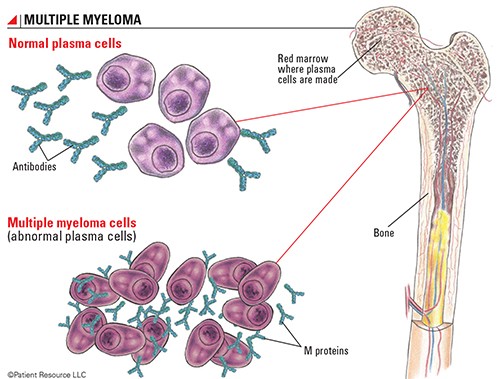
Recently Diagnosed or Relapsed? Stop Looking For a Miracle Cure, and Use Evidence-Based Therapies To Enhance Your Treatment and Prolong Your Remission
Multiple Myeloma an incurable disease, but I have spent the last 25 years in remission using a blend of conventional oncology and evidence-based nutrition, supplementation, and lifestyle therapies from peer-reviewed studies that your oncologist probably hasn't told you about.
Click the orange button to the right to learn more about what you can start doing today.
- You are here:
- Home »
- Blog »
- Multiple Myeloma »
- Myeloma, Anti-Aging Therapy, Vitamin D3
Myeloma, Anti-Aging Therapy, Vitamin D3

“Given the role of vitamin D in calcium absorption and bone metabolism, it is crucial to maintain sufficient levels for multiple myeloma patients because of their high risk of bone-related complications.”
I take supplements that research shows can reduce the risk of multiple myeloma. In the case of vitamin D3, this supplementation also reduces my risk of “cognitive decline, depression, osteoporosis, cardiovascular disease, high blood pressure, Type 2 diabetes and cancer…”In my view vitamin D3 is an anti-aging therapy. Or to put it another way, supplementing with vitamin D3 provides multiple benefits.
To fill in a gap or two in the first article linked below. My work with vitamin D3 supplementation is about the levels of vitamin D3 in a person’s blood or serum. In other words, no study will say a person should take x amount of vitamin D3 because everyone absorbs vitamin D3 differently. Anyone can get vitamin D3 from the sun. I live in Cleveland, Ohio and therefore don’t get as much sun as someone who lives in Florida.
The study will say, for example, serum blood levels of vitamin D3 below 20 ng/dL are deficient. And that serum blood levels should be between 30-40 ng/dL, based on our research. Something like that. I’ve had my blood levels checked for vitamin D3 annually for years. My results indicate that my blood levels are between 30-40 ng/dL. I take 1,000 mg of vitamin D3 twice daily with food.
But again, you may be different. Get your blood tested for vitamin D3.
To Learn More about vitamin D3- click now
For more information about evidence-based nutrition, supplementation, lifestyle therapies that reduce the risk of multiple myeloma and other debilitating diseases of old age, scroll down the page, post a question or a comment and I will reply to you ASAP.
thank you,
David Emerson
- Long-term MM Survivor
- MM Cancer Coach
- Director PeopleBeatingCancer
Recommended Reading:
- Vitamin D3, Chronic Disease and Cancer
- Vitamin D3-improves balance, muscle strength and minimizes falls.
- Low Vitamin D Levels in Stroke Patients Up Risk of DVT
Vitamin D Levels Are Frequently below Normal in Multiple Myeloma Patients and Are Infrequently Assessed By Their Treating Physicians
“Introduction: In addition to breast and colorectal cancers, multiple myeloma has also been associated with vitamin D deficiency. Given the role of vitamin D in calcium absorption and bone metabolism, it is crucial to maintain sufficient levels for multiple myeloma patients because of their high risk of bone-related complications. We hypothesized that there was a high prevalence of vitamin D deficiency and insufficiency among multiple myeloma patients. We also hypothesized that there is inadequate screening of vitamin D levels throughout community oncology clinics nationwide…
Anti-aging and anti-cancer- one and the same?
“They want to test a pill that could prevent or delay some of the most debilitating diseases of old age, including Alzheimer’s and cardiovascular disease. The focus of the project isn’t to prolong life, although that could occur, but to make the last years or decades of people’s lives more fulfilling by postponing the onset of many chronic diseases until closer to death…”
Vitamin D may help prevent, treat diseases associated with aging
“Vitamin D may play a vital role in the prevention and treatment of diseases associated with aging, according to researchers. Researchers reviewed evidence that suggests an association between vitamin D deficiency and chronic diseases associated with aging such as cognitive decline, depression, osteoporosis, cardiovascular disease, high blood pressure, Type 2 diabetes and cancer…
Vitamin D and anti-aging medicine.
“Vitamin D has many important roles in calcium and phosphorus metabolisms, the prevention of the cancer, therapeutic effects of autoimmune disease, and the protective effects on the atherosclerotic cardiovascular disease and diabetes. These functions are quite essential factors for the treatment of anti-aging medicine…
To keep the normal functions of the bone mineral metabolisms and the immune function, it is clinically relevant to detect the vitamin D levels in the blood and support these levels using supplements in the vitamin D deficient patients. Vitamin D is now one of the most essential vitamins in the anti-aging medicine…”


